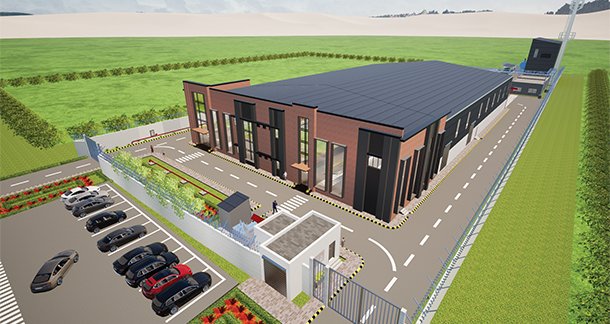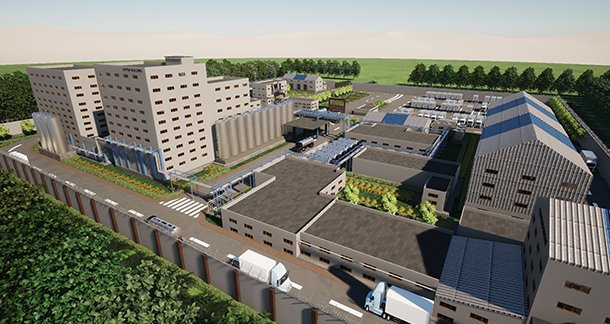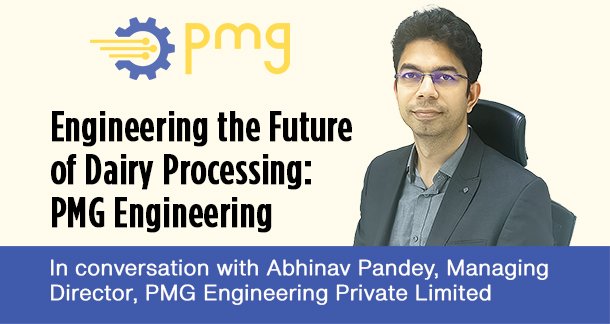In Conversation with Abhinav Pandey, Managing Director, PMG Engineering Private Limited, he delves into the the company’s journey, scope of work, ways in which they ensure high standards of quality in food factory design, food safety, sustainability, and more.
Question- PMG Engineering has become a reputed name in food factory design, especially in the dairy sector. Can you tell us about PMG’s journey and your focus in this space?
At PMG Engineering, our mission is simple but powerful- to design and build food factories the right way. Since our founding in 2015, we have delivered over 250 projects across 15 countries. Our specialization lies in the food and beverage sector, with dairy processing being one of our strongest verticals. As of today, dairy factories designed by PMG collectively process over 15 million liters of fresh milk every single day.We have contributed to the full spectrum of dairy manufacturing, from large-scale liquid milk processing to high-value products such as casein, whey, lactose, nutrition powders, and aseptic dairy beverages.
Our involvement spans both greenfield and brownfield projects, where we provide comprehensive design and construction supervision. Our goal is to help clients meet global standards in food safety, hygiene, and production efficiency, within a project cost that delivers business value. PMG offers a single-window solution for building world-class food factories. Our scope includes engineering design, procurement assistance, project management, construction supervision, factory assessments, and various technical services. We essentially become the engineering arm of the client’s organization throughout the project lifecycle.
Question- What makes PMG’s engineering approach different from traditional dairy project consultants?
PMG Engineering offers a fundamentally different value proposition—one built on ownership, integration, and performance. We bring together a full in-house team of engineers across all domains to deliver a unified, end-to-end solution. Whether it is a greenfield plant or an upgrade, we do not just replicate old solutions, we customize the design to meet specific business, technical, and regulatory goals.
Our approach is rooted in transparency and accountability. We avoid verbal instructions and ensure that all design intent is clearly documented in self-explanatory GFC (Good For Construction) drawings. Clients are empowered to make informed procurement decisions with comparative vendor analyses, and we maintain complete independence from any supplier or contractor. This ensures the best outcomes at every stage—technically and commercially.

Question- Food safety is a growing concern. What does PMG do differently to ensure hygienic engineering in dairy plants?
Food safety in dairy is absolutely non-negotiable. Milk is one of the most microbiologically sensitive food products, and poor factory design can result in contamination, spoilage, and compliance failures. At PMG, hygienic engineering is embedded from the very first concept sketch through to execution. Our Early Management Workflow ensures these principles are systematically incorporated into basic design, detailed engineering, and site execution—across buildings, equipment, piping, and air handling systems.
What differentiates us is our cross-functional food industry experience. All our engineers—process, civil, mechanical, electrical, automation—are trained with a food lens. We design infrastructure that is not only efficient but also fully compliant with global food safety standards such as FSSC 22000, ISO 22000, BRC, and FDA.
Moreover, we take an unbiased approach to engineering—free from vendor affiliations. Every element is documented with clarity, enabling first-time-right execution. Our on-site teams guide contractors with precision to ensure zero rework and high food safety assurance. For us, hygienic engineering is not an afterthought—it’s the backbone of everything we do.
Question- What advice would you give to dairy businesses looking to expand or modernize their factories?
The most important advice I can offer is this: treat engineering not as a cost, but as a strategic investment. Many businesses make the mistake of rushing into procurement or construction without adequate engineering. This often leads to poorly performing factories, cost overruns, and long-term operational headaches.
Second, dairy businesses should avoid working with fragmented consultants or siloed experts. A dairy factory is a complex system made up of many interconnected sub-systems—process, civil, mechanical, electrical, utilities, automation, and hygiene.
Third, plan your factory for the next 20 years, not just the next two. Scalability, flexibility, and compliance should be embedded into the design from day one.
Finally, surround yourself with engineers—not just advisors. Ideas are valuable, but implementation is everything. Consultants may offer hundreds of suggestions, but without the capability to design, coordinate, and supervise execution, the outcome will always be compromised. The goal should be to build a factory that doesn’t just meet today’s benchmarks but sets new ones—and that requires engineering excellence backed by real ownership.
Question- Sustainability is becoming non-negotiable. What innovations or technologies has PMG integrated into dairy plant design to improve energy efficiency and reduce carbon footprint?
Our designs incorporate waste heat recovery systems that capture thermal energy from evaporators, compressors, and flue gases. This recovered heat is then used to preheat incoming milk or generate hot water for CIP (Cleaning-in-Place) cycles, effectively reducing steam load. We also deploy high-efficiency refrigeration systems using natural refrigerants such as ammonia or CO₂, combined with variable frequency drive (VFD) compressors, optimized condenser fans, and thermal storage solutions to lower peak energy consumption. Additionally, we implement rainwater harvesting systems and design plants with Zero Liquid Discharge (ZLD) capability to minimize water waste and improve sustainability.
Our buildings follow IGBC/AP green building norms, incorporating natural lighting, efficient ventilation, and low-emission materials to reduce both operational and embodied carbon. Rooftop and ground-mounted solar PV systems are planned to offset electrical demand for utilities such as lighting, HVAC, and auxiliary equipment. For high-COD dairy effluent, we help clients install anaerobic digesters to generate biogas, which can be reused as fuel for boilers or converted to electricity. To support data-driven sustainability goals, we use advanced digital tools to simulate and benchmark energy and water consumption. This allows clients to forecast the carbon intensity per liter of milk processed and set realistic ESG targets. The outcome is a dairy plant that is not only efficient and compliant, but also ready for green audits, climate disclosures, and sustainability-linked financing.

Question- What trends do you foresee shaping the next decade of dairy manufacturing in India, and how is PMG adapting to these changes?
The Indian dairy sector is undergoing a major transformation. It’s shifting from being volume-led to value-led, with a strong focus on quality, compliance, and technology. The next decade will be shaped by five key trends:
- Product Diversification: Beyond liquid milk and powders, there’s a growing shift toward nutritional, probiotic, and ready-to-drink dairy products. Plants must now be designed for SKU flexibility—able to handle multiple recipes, batch sizes, and packaging formats.
- Automation & Digitization: Real-time data tracking, predictive maintenance, and SCADA-based control systems are becoming essential for quality, traceability, and efficiency. At PMG, we design plants with full digital twin compatibility, allowing clients to simulate, monitor, and optimize operations remotely.
- Regulatory Compliance & Traceability: With FSSAI and global export standards tightening, dairy plants will need full track-and-trace capabilities—from raw milk intake to final dispatch. We integrate barcode-enabled traceability and automated CIP validation from day one.
- Energy & Water Optimization: With rising energy costs and environmental concerns, future-ready dairy plants will need to be low-footprint and resource-efficient. We’re already implementing modular MVR evaporators, heat integration loops, and green building envelopes in our current designs.
- Decentralized and Regional Plants: As logistics and cold chain costs grow, manufacturers are investing in smaller, regional plants closer to milk sources. PMG is adapting by offering modular design templates that allow fast deployment and easy scale-up for such facilities.
In summary, the future will belong to dairy businesses that combine innovation with compliance, flexibility with hygiene, and growth with sustainability. At PMG, our role is to engineer these ambitions into practical, high-performance infrastructure.
To learn more, visit www.pmg.engineering or reach out to Abhinav Pandey at Abhinav.Pandey@pmg.engineering



